-
【Windows】RPC调用过程实例详解
概述:windows 创建 RPC调用过程实例详解
参考文章:Remote procedure call (RPC)(远程过程调用 (RPC)) - Win32 apps | Microsoft Learn
0x01、生成 UUID 和模版(IDL)文件
定义接口的第一步是使用 uuidgen 实用工具生成通用唯一标识符(UUID)。UUID使客户端和服务端能够相互识别。该工具包含在阿庄平台软件开发工具包中(SDK)。
一般安装路径位于:
D:\Windows Kits\10\bin\10.0.22621.0\x64以下命令生成 UUID 并创建名为 Hello.idl 的模版文件。
uuidgen /i /ohello.idl- 1
模版内容大致如下:
[ uuid(7a98c250-6808-11cf-b73b-00aa00b677a7), version(1.0) ] interface hello { }- 1
- 2
- 3
- 4
- 5
- 6
- 7
- 8
在模版中添加接口:
//file hello.idl [ uuid(7a98c250-6808-11cf-b73b-00aa00b677a7), version(1.0) ] interface hello { void HelloProc([in, string] unsigned char * pszString); void Shutdown(void); }- 1
- 2
- 3
- 4
- 5
- 6
- 7
- 8
- 9
- 10
0x02、添加 acf 文件
acf文件内容如下所示,导出接口需要与 idl 文件一致:
//file: hello.acf [ implicit_handle (handle_t hello_IfHandle) ] interface hello { }- 1
- 2
- 3
- 4
- 5
- 6
- 7
0x03、编译 idl 文件
-
打开 visual studio,新建一个空项目
-
空项目中添加上述 idl文件 和 acf文件
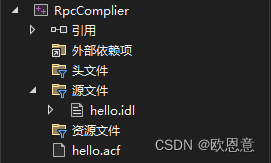
-
编译项目
-
生成 hello_h.h、hello_c.c、hello_s.c
- hello_h.h: 服务端和客户端共用文件
- hello_c.c: 客户端文件
- hello_s.c: 服务端文件
需要补充说明的是,在 hello_h.h 头文件中有两个导出接口,导出接口即为rpc调用的接口。
extern RPC_IF_HANDLE hello_v1_0_c_ifspec; extern RPC_IF_HANDLE hello_v1_0_s_ifspec;- 1
- 2
0x04、客户端
新建工程文件如下所示:
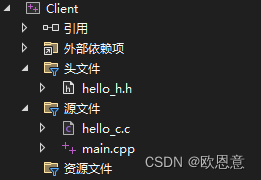
main.cpp
//client.cpp #include#include using namespace std; #include "hello_h.h" #pragma comment(lib,"Rpcrt4.lib") void doRpcCall(); int main(int argc, char** argv) { int i = 0; RPC_STATUS status = 0; unsigned char* pszNetworkAddr = NULL; unsigned char* pszStringBinding = NULL; for (i = 1; i < argc; i++) { if (strcmp(argv[i], "-ip") == 0) { pszNetworkAddr = (unsigned char*)argv[++i]; break; } } status = RpcStringBindingCompose(NULL, (unsigned char*)"ncacn_np", pszNetworkAddr, (unsigned char*)"\\pipe\\hello", NULL, &pszStringBinding); if (status != 0) { cout << "RpcStringBindingCompose returns: " << status << "!" << endl; return -1; } cout << "pszStringBinding = " << pszStringBinding << endl; status = RpcBindingFromStringBinding(pszStringBinding, &hello_IfHandle); if (status != 0) { cout << "RpcBindingFromStringBinding returns: " << status << "!" << endl; return -1; } doRpcCall(); status = RpcStringFree(&pszStringBinding); if (status != 0) cout << "RpcStringFree returns: " << status << "!" << endl; status = RpcBindingFree(&hello_IfHandle); if (status != 0) cout << "RpcBindingFree returns: " << status << "!" << endl; cin.get(); return 0; } void doRpcCall(void) { char buff[1024]; RpcTryExcept{ while (true) { cout << "Please input a string param for Rpc call:" << endl; cin.getline(buff, 1023); if (strcmp(buff, "exit") == 0 || strcmp(buff, "quit") == 0) { Shutdown(); } else { HelloProc((unsigned char*)buff); cout << "call helloproc succeed!" << endl; } } } RpcExcept(1) { unsigned long ulCode = RpcExceptionCode(); cout << "RPC exception occured! code: " << ulCode << endl; } RpcEndExcept } void* __RPC_USER MIDL_user_allocate(size_t len) { return (malloc(len)); } void __RPC_USER MIDL_user_free(void* ptr) { free(ptr); } - 1
- 2
- 3
- 4
- 5
- 6
- 7
- 8
- 9
- 10
- 11
- 12
- 13
- 14
- 15
- 16
- 17
- 18
- 19
- 20
- 21
- 22
- 23
- 24
- 25
- 26
- 27
- 28
- 29
- 30
- 31
- 32
- 33
- 34
- 35
- 36
- 37
- 38
- 39
- 40
- 41
- 42
- 43
- 44
- 45
- 46
- 47
- 48
- 49
- 50
- 51
- 52
- 53
- 54
- 55
- 56
- 57
- 58
- 59
- 60
- 61
- 62
- 63
- 64
- 65
- 66
- 67
- 68
- 69
- 70
- 71
- 72
- 73
- 74
- 75
- 76
- 77
- 78
- 79
- 80
- 81
- 82
- 83
- 84
- 85
- 86
- 87
- 88
- 89
- 90
- 91
- 92
- 93
0x05、服务端
新建工程文件如下所示:
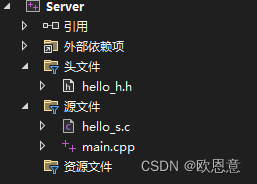
main.cpp
#includeusing namespace std; #include "hello_h.h" #pragma comment(lib,"Rpcrt4.lib") int main(void) { RPC_STATUS status = 0; unsigned int mincall = 1; unsigned int maxcall = 20; status = RpcServerUseProtseqEp( (unsigned char*)"ncacn_np", maxcall, (unsigned char*)"\\pipe\\hello", NULL); if (status != 0) { cout << "RpcServerUseProtseqEp returns: " << status << endl; return -1; } status = RpcServerRegisterIf( hello_v1_0_s_ifspec, NULL, NULL); if (status != 0) { cout << "RpcServerRegisterIf returns: " << status << endl; return -1; } cout << "Rpc Server Begin Listening..." << endl; status = RpcServerListen(mincall, maxcall, FALSE); if (status != 0) { cout << "RpcServerListen returns: " << status << endl; return -1; } cin.get(); return 0; } /************************************************************************/ /* MIDL malloc & free */ /************************************************************************/ void* __RPC_USER MIDL_user_allocate(size_t len) { return (malloc(len)); } void __RPC_USER MIDL_user_free(void* ptr) { free(ptr); } /************************************************************************/ /* Interfaces */ /************************************************************************/ void HelloProc(unsigned char* szhello) { cout << szhello << endl; } void Shutdown(void) { RPC_STATUS status = 0; status = RpcMgmtStopServerListening(NULL); if (status != 0) { cout << "RpcMgmtStopServerListening returns: " << status << "!" << endl; } status = RpcServerUnregisterIf(NULL, NULL, FALSE); if (status != 0) { cout << "RpcServerUnregisterIf returns: " << status << "!" << endl; } } - 1
- 2
- 3
- 4
- 5
- 6
- 7
- 8
- 9
- 10
- 11
- 12
- 13
- 14
- 15
- 16
- 17
- 18
- 19
- 20
- 21
- 22
- 23
- 24
- 25
- 26
- 27
- 28
- 29
- 30
- 31
- 32
- 33
- 34
- 35
- 36
- 37
- 38
- 39
- 40
- 41
- 42
- 43
- 44
- 45
- 46
- 47
- 48
- 49
- 50
- 51
- 52
- 53
- 54
- 55
- 56
- 57
- 58
- 59
- 60
- 61
- 62
- 63
- 64
- 65
- 66
- 67
- 68
- 69
- 70
- 71
- 72
- 73
- 74
- 75
- 76
- 77
- 78
- 79
- 80
- 81
0x06、编译并运行
分别编译客户端和服务端程序,得到 server.exe 和 client.exe
- 先运行 server.exe
- 在 client.exe 目录运行
client -ip 192.168.106.128来启动客户端程序并与服务器端相连 - 在 client 的窗口输入任意字符串,回车后可看到server窗口上有显示
- 在 client 窗口内 输入 exit 或 quit, server 窗口关闭
0x07、运行示例
Client
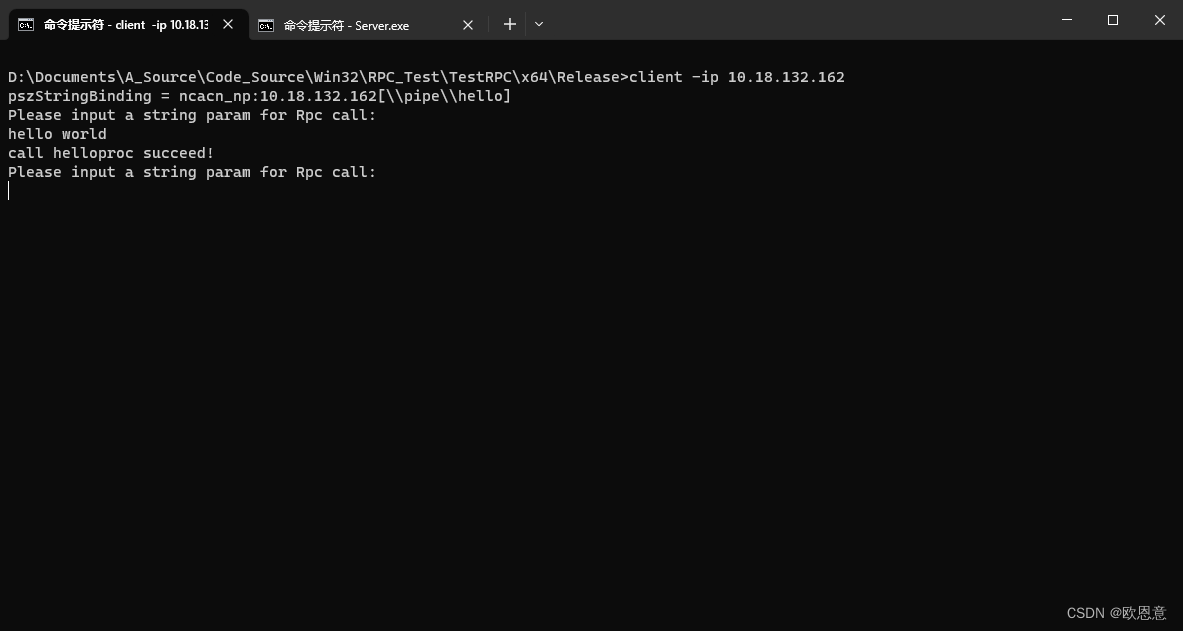
Server
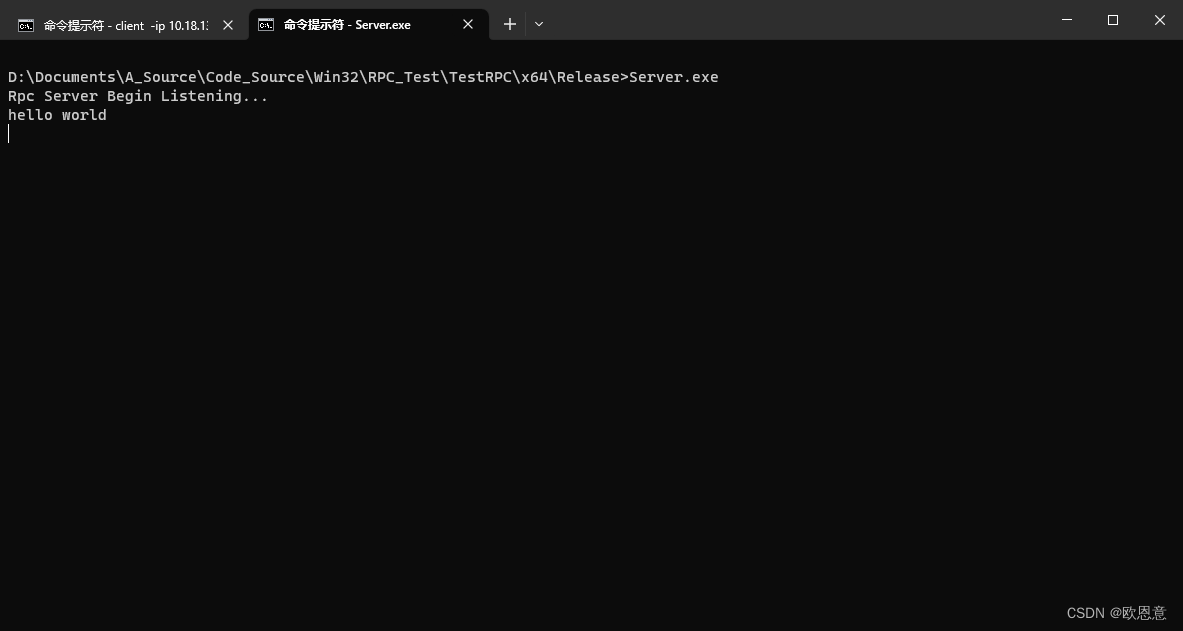
-
相关阅读:
【排序】详解冒泡排序
[美国访问学者]J1签证和商务B1签证的区别
Docker部署前后端服务示例
skywalking
JavaScript高级知识-this的指向
设计师必备的插画设计素材网站
记一次前端CryptoJS AES解密
为了沙漠中的奋进者:“视人为人”的陕煤曹家滩 智慧矿区
Gateway的服务网关
FlinkSQL自定义UDAF使用的三种方式
- 原文地址:https://blog.csdn.net/Fuel_Ming/article/details/133679653
